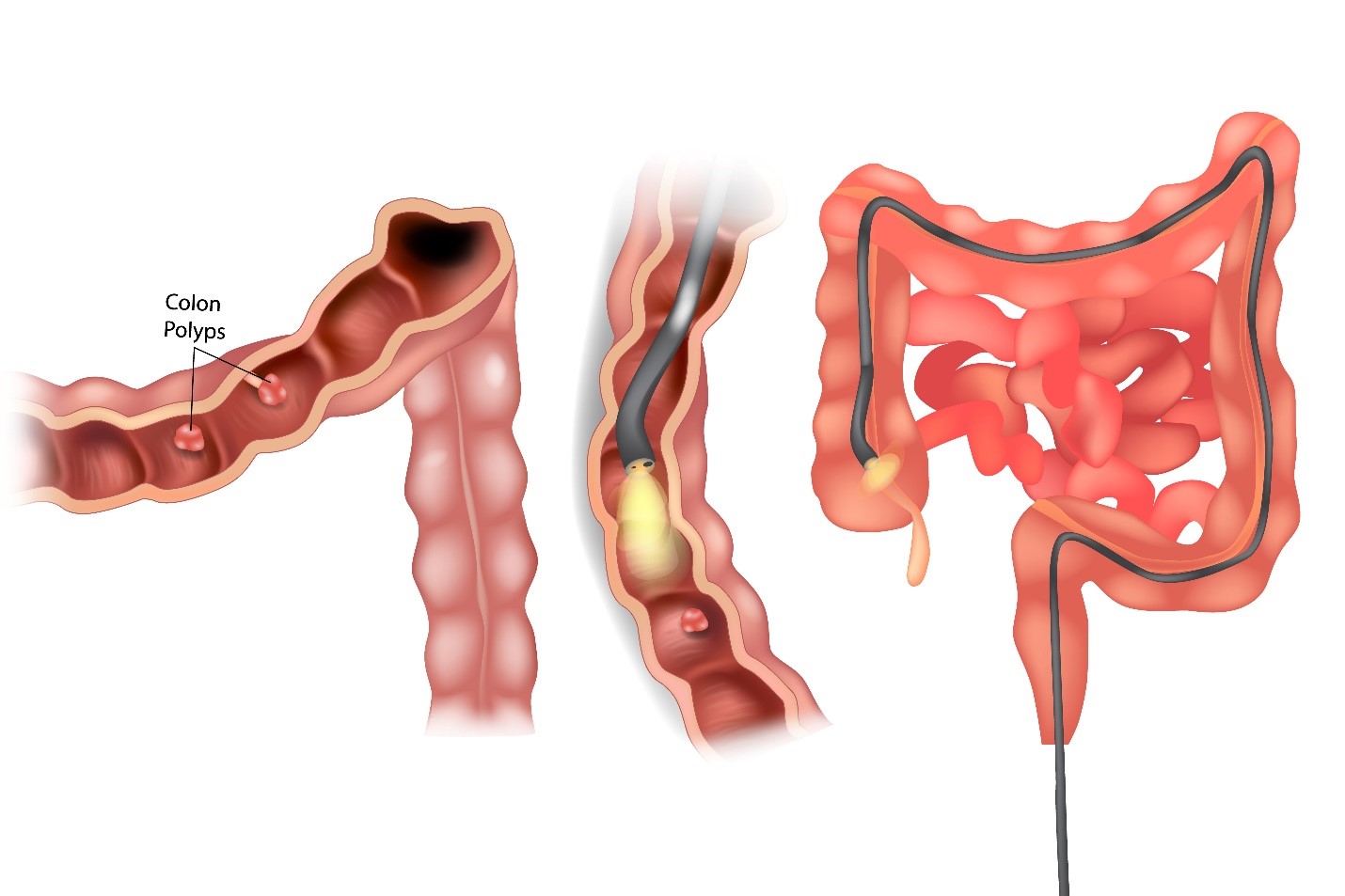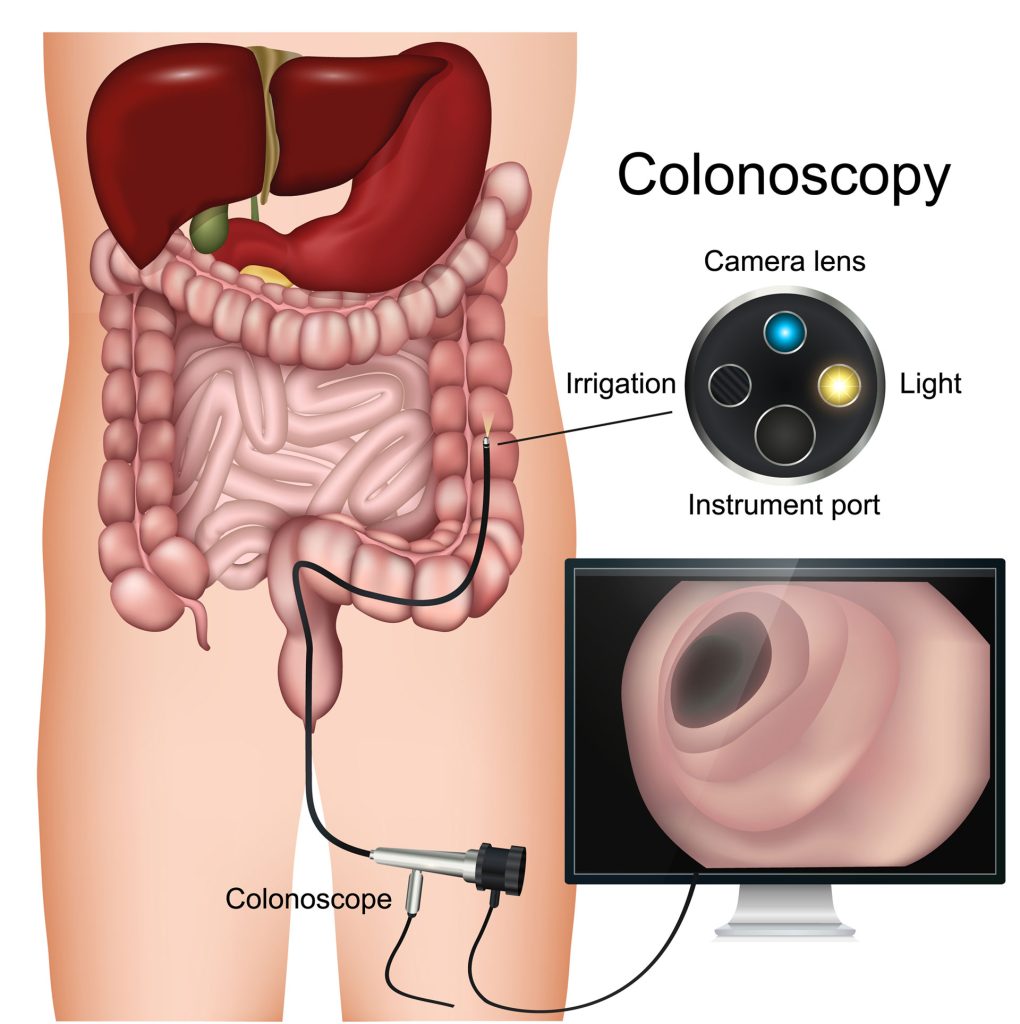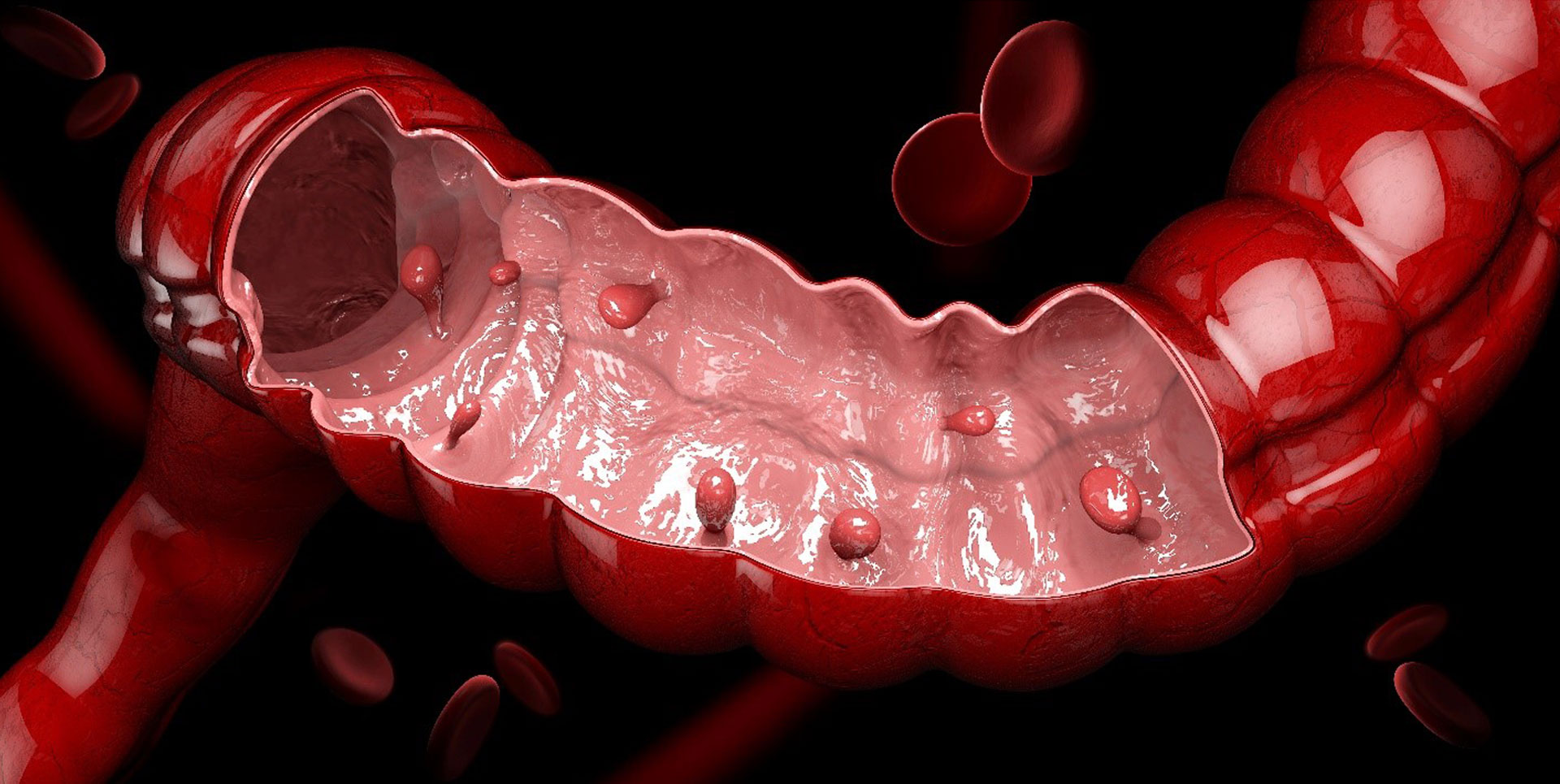Conditions And Treatments
Home / Areas Of Specialty / Colonoscopy
What Is A Colonoscopy?
A colonoscopy is a procedure that enables your physician to examine the lining of the colon for abnormalities. Colon is also known as large intestine. Your colorectal surgeon will insert a lighted flexible tube about the thickness of a finger into the anus. It is called a Colonoscope. This helps visualize the lining of rectum and colon.
What Happens During A Colonoscopy? And How long does a colonoscopy take?
Most people tolerate colonoscopy procedure very well and occasionally can have minimal discomfort and rarely any pain. You may feel a sense of pressure, bloating, or cramping at times during the procedure. Certainly, you may get medications for sedation through a vein to help you relax to safely perform the procedure. You will lie on your side or on back while the colonoscope is advanced slowly through the large intestine. Your colorectal surgeon will slowly withdraw the scope out and will also visualize the lining of your colon and rectum. Overall, colonoscopy procedure normally takes about 20 to 30 minutes.

Furthermore, In some cases your colorectal surgeon may not be able to pass the colonoscope all the way to the junction with small intestine. Common reasons for this can be anatomical like narrowing, tortuosity or blockage of colon or sometimes poor bowel preparation. Colorectal surgeon will decide if the limited examination is sufficient or if other tests are necessary. If you are unable to have a completion colonoscopy for any reason, then your surgeon can order other alternative tests as needed.

Do I need a Colonoscopy prep?
Another key point is that it is very important to follow the bowel preparation instructions so that colonoscopy procedure can be completed. It also allows a better visualization of the colon lining and helps in polyp removal. Failure to have a good bowel preparation can lead to a repeat procedure. Please check with your colorectal surgeon as there are many different types of bowel prep options available.
How To Interpret Colonoscopy Results?
Your surgeon may obtain a biopsy during the colonoscopy based on the findings. Biopsy means taking a sample of the lining. Pathologists will check all the specimens and give report in few days. If you are undergoing a colonoscopy procedure to identify the source of bleeding, then your surgeon may inject certain medications or use coagulation to control the bleeding. Coagulation is a technique of sealing the blood vessels by heat treatment. Your colorectal surgeon will remove the polyps as needed based on the size of the polyp using different techniques. None of these additional procedures typically produce pain. Another key point is that your physician may obtain biopsies for many different reasons and not necessarily for cancer during the colonoscopy procedure.
What Are Polyps, And why do you remove them?
Polyps are abnormal growths from the lining of the colon that vary in size from a less than a mm to many centimeters. The majority of polyps are benign. But the doctor cannot always tell a benign polyp from a malignant one by its outer appearance alone. In general, benign means which do not turn into cancer and malignant means cancerous. If your colorectal surgeon removes the polyps, certainly they will be tested for any cancer or abnormality. Removal of the colon polyps is an important way of preventing colorectal cancer.
What Are Different Techniques To Remove Polyps?
Your Colorectal surgeon may use different techniques including use of forceps, snare or other technology. You should feel no pain during a polyp removal. Risks include bleeding, colon perforation or injury. Rarely, you may need emergent surgery or hospitalization if any complication happens.

What Happens After The Procedure?
After the colonoscopy procedure, your surgeon will explain the result to you. Additionally, if you received a sedation medication during the procedure, then someone must drive and accompany you home. Although you may feel alert after the procedure, but you may have impaired judgment and reflexes for the remainder of the day, so it is not safe to drive or operate any machinery. You may experience some cramping or bloating after the procedure. This should discontinue promptly with the passage of gas. You should be able to eat your previous date after the colonoscopy and please check with your surgeon regarding the resumption of your home medications. If your colorectal surgeon removes any polyp, then he may advise you to hold certain kind of medications like blood thinners for some time after the procedure.
Are There Any Risks Or Complications Of The Procedure?
Colonoscopy is generally a very safe procedure, when performed by physicians who have been trained and are experienced in these endoscopic procedures. There are few possible complications of the procedure like bleeding especially after polypectomy, risk of perforation or tear through the colon wall. You may also have anesthesia related complications like allergic reactions, risk of aspiration, risk of inflammation or infection or localized irritation at the intravenous injection site used during the procedure. Rarely you may need blood transfusions or need emergency surgery for any potential complication.
Other potential risks of colonoscopy procedure include an allergic reaction to the sedatives used, as well as complications from heart and lung disease. Although complications after a colonoscopy are uncommon, it is important for you to recognize early signs of any possible complications. Contact your physician who performed the procedure if you notice any of the following symptoms like severe abdominal pain, fever, chills, or rectal bleeding more than ½ a cup. Sometimes you may have rectal bleeding several days after polypectomy.
What is a colon and Rectal Surgeon? Is Dr Singh a Board-certified Colorectal surgeon? and where does he perform his procedures.
Colon and rectal surgeons are experts in the surgical and non-surgical treatment of diseases of the colon, rectum, and anus. They have completed advanced surgical training in the treatment of these diseases, as well as full general surgical training. They are well versed in the treatment of both benign and malignant diseases of the colon, rectum, and anus and are able to perform routine screening examinations and surgically treat conditions as and if needed. Dr Singh is a double board certified in Colon and Rectal Surgery and General surgery. His practice is located in Phoenix, Glendale and Scottsdale, AZ.
For more information on Colon cancer screening please click on the following link:
Colonoscopy | ASCRS (fascrs.org)
Screening and Surveillance for Colorectal Cancer Expanded Version | ASCRS (fascrs.org)
Colon Polyps – Dr Neeraj Singh (colorectaldoc.com)
Colon Cancer – Dr Neeraj Singh (colorectaldoc.com)
Home – Colon & Rectal Care Center of Phoenix (colorectaldoc.com)

